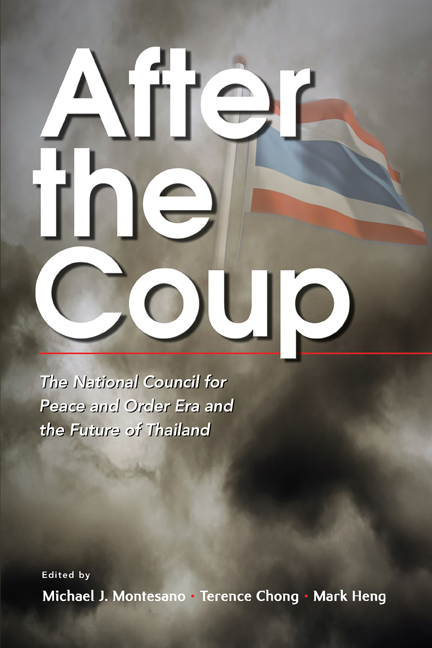Book contents
- Frontmatter
- Contents
- About the Contributors
- 1 Introduction: Thai Realities and Possibilities after the 22 May Coup
- 2 The Rise of the Thai Upper Middle Class and its Turn against Democracy
- 3 “We the Southerners Come to Protect the Nation and the King”: Southerners’ Political Rise and Regional Nationalism in Thailand
- 4 Exit, Voice, (Dis)loyalty? Northeast Thailand after the 2014 Coup
- 5 The Red Shirts and their Democratic Struggle in Northern Thailand, April 2010 – May 2015
- 6 The Shifting Battleground: Peace Dialogue in Thailand's Malay-Muslim South
- 7 Thailand's Zigzag Road to Democracy: Continuity and Change in Military Intervention
- 8 Murder and Regress: Violence and Political Change in Thailand
- 9 Thailand's Politics of Decentralization: Reform and Resistance before and after the May 2014 Coup
- 10 Change and Continuity in the Politics of the Media after the Coup
- 11 Thailand's Royal Democracy in Crisis
- 12 The Foreign Press and its Changing Perceptions of the Thai Monarchy
- 13 Thai Economic Growth: Retrospect and Prospect
- 14 Features and Challenges of an Ageing Population in Thailand
- 15 Conclusion: Thailand in Transition
- Bibliography
- Index
10 - Change and Continuity in the Politics of the Media after the Coup
Published online by Cambridge University Press: 23 May 2019
- Frontmatter
- Contents
- About the Contributors
- 1 Introduction: Thai Realities and Possibilities after the 22 May Coup
- 2 The Rise of the Thai Upper Middle Class and its Turn against Democracy
- 3 “We the Southerners Come to Protect the Nation and the King”: Southerners’ Political Rise and Regional Nationalism in Thailand
- 4 Exit, Voice, (Dis)loyalty? Northeast Thailand after the 2014 Coup
- 5 The Red Shirts and their Democratic Struggle in Northern Thailand, April 2010 – May 2015
- 6 The Shifting Battleground: Peace Dialogue in Thailand's Malay-Muslim South
- 7 Thailand's Zigzag Road to Democracy: Continuity and Change in Military Intervention
- 8 Murder and Regress: Violence and Political Change in Thailand
- 9 Thailand's Politics of Decentralization: Reform and Resistance before and after the May 2014 Coup
- 10 Change and Continuity in the Politics of the Media after the Coup
- 11 Thailand's Royal Democracy in Crisis
- 12 The Foreign Press and its Changing Perceptions of the Thai Monarchy
- 13 Thai Economic Growth: Retrospect and Prospect
- 14 Features and Challenges of an Ageing Population in Thailand
- 15 Conclusion: Thailand in Transition
- Bibliography
- Index
Summary
Nearly two decades ago, Duncan McCargo argued that the Thai media constituted “a political space in which different elite groups have sought to advance their interests and views” (McCargo 2000, p. 166). This chapter assesses patterns of continuity and change in the relationship between the media, both traditional and social, and politics in Thailand in the inter-coup period between 2006 and 2014 and the post-coup period since 2014. Using McCargo's analysis of the Thai press as a departure point, we focus on the period of the last decade for three reasons. First, Thailand experienced unprecedented levels of political and social upheaval — marked by prolonged and violent street protests, significant political instability and two military coups d’état — during that decade. Second, the proliferation of information and communications technology for mass consumption in the 2010s has led to an expansion of space for civic engagement. Third, the military government has sought since 2014 to institutionalize information controls in ways that would have a negative impact on future relations between the state and the media. We therefore evaluate and analyse how this period of heightened political conflict, on the one hand, and the rapid expansion of social media use, on the other, have fostered change or demonstrated continuity in the dominance of political elites, including the National Council for Peace and Order (NCPO, khana raksa khwamsangop haeng chat) junta, over the media landscape.
We advance two claims in this chapter. First, political elites have continued to exert control and influence over traditional and social media in three major ways: (1) establishing new institutions to reduce media independence, (2) taking direct ownership of media outlets in order to advance their political agenda, and (3) shaping the content and discourse of both traditional and social media through state channels. Specifically, we argue that the Thai military and its conservative-royalist allies made a comeback in exerting dominance over the media during two recent periods of authoritarian rule, 2006–7 and 2014–15. The creation of new institutions to govern both traditional and social media — most notably the constitution of 2006 and the 2007 Computer-Related Crime Act (CCA) — constrained media independence and press freedom in ways that allowed political elites to re-exert their dominance. Of particular use to government agencies and the military, these institutions were not created to advance the interest of the public or to protect freedom of press and of expression.
- Type
- Chapter
- Information
- After the CoupThe National Council for Peace and Order Era and the Future of Thailand, pp. 254 - 281Publisher: ISEAS–Yusof Ishak InstitutePrint publication year: 2019

